Prospero the Etruscan and Lying Historians February 13, 2011
Author: Beach Combing | in : Ancient, Modern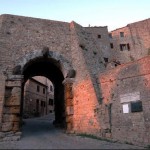
Liars and history go together like a horse and carriage. Beachcombing gave a chance reference to Herodotus as ‘Father of Lies’ in yesterday’s post. ‘Pseudo-‘ and ‘Mythic-History’, typically found in tribal societies, are porkies by modern standards. But most interestingly, at least for Beachcombing, are the scholars/antiquarians who betray the very rules that they claim themselves to […]
Total Eclipse February 12, 2011
Author: Beach Combing | in : Ancient, Contemporary, Modern
A reader – Moonman to friends – has written in to remind Beachcombing of the old ‘cover thy face’ trick whereby ‘the civilised’ with knowledge of an eclipse, show their power over the elements by ‘ordering’ the sun to disappear in the presence of the unenlightened. Beachcombing knows this trick from Hergé’s Prisoners of […]
Diodorus’ Island February 10, 2011
Author: Beach Combing | in : Ancient
Perhaps next to Forgotten Kingdoms Beachcombing should set up a tag on Invisible Kingdoms: realms that very likely only ever existed in the imagination of ancient and medieval writers. There would be Atlantis, of course, the land of Prester John, the Seven Cities of Gold and El Dorado. And to these it would be a cinch […]
Review: Myth or Legend? February 9, 2011
Author: Beach Combing | in : Ancient, Medieval
C.E. Daniel et alii, Myth or Legend? (New York/London 1956) What is the difference between myth and a legend? Well, according to this little BBC miscellany from the 1950s a myth is ‘invention and fancy’, while legend is ‘some kind of history’. This distinction gets right at our main concerns with so many of those […]
Atlantean ‘Flying Boats’ February 7, 2011
Author: Beach Combing | in : Ancient, Modern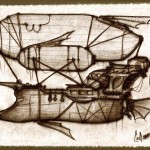
Beachcombing sometimes likes to jot down contents lists for books that he will never write: a further rather melancholy contribution to his Invisible Library collection. He has recently been playing around with Old Atlantis: A Miscellany of Atlantean Madness. The work would have three parts: a bibliography of every book every written on the lost Continent – […]
Sex Life of Unicorns February 5, 2011
Author: Beach Combing | in : Ancient, Medieval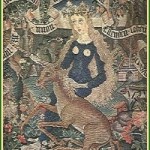
Unicorns have a claim, in Beachcombing’s mind, to be the most interesting of all mythical creatures. There is, after all, a fascinating combination of the mundane – the unicorn is surely based on the rhinoceros? – and the fantastic: think of all that nonsense about a dilating horn and floating hooves. Then there is the […]
Human Sacrifice and the Athenians January 29, 2011
Author: Beach Combing | in : Ancient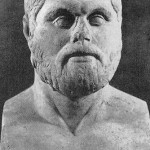
Human sacrifice does survive in literate cultures – the Aztecs, various medieval Indian states… But in Europe, at least, it melted away at about the time of the first extensive surviving texts. The result is that Greeks or Romans or Gaels or Germanic types rarely end up putting a knife into a sacrificial victim: […]
Irish Werewolf Cub-Scouts from Hell? January 26, 2011
Author: Beach Combing | in : Ancient, Medieval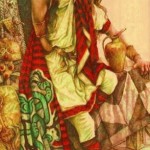
Irish werewolf cub-scouts from hell… Sounds like a bad slasher film doesn’t it? But actually Beachcombing is about to introduce a genuine all singing, all dancing early medieval Irish institution. His first reading is from the Annals of Ulster for AD 847 ‘the sack of the island of Loch Muinremair by Mael Sechnaill [Irish High King] […]
The Werewolf of Temesa January 25, 2011
Author: Beach Combing | in : Ancient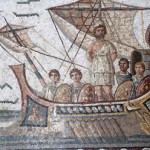
A painfully short post tonight but Tiny Miss B is screaming next to the keyboard, Mrs B is out looking for a school for the elder daughter and Little Miss B is making the au pair’s life an inferno downstairs. So in dereliction of parental duty another part of the soon-to-end werewolf series: let’s hope […]
A Pillar and an Archer in Medieval Alexandria January 23, 2011
Author: Beach Combing | in : Ancient, Medieval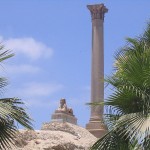
Ancient pillars survive even when associated buildings collapse. Many Greco-Roman pillars, indeed, are still standing today: a testimony to the durability of early Mediterranean civilisation. The medieval dwarfs looking back at the achievements of the classical world often got excited by pillars. Pillars were probably in part responsible for causing an early English poet […]
A Roman Werewolf and a Dinner Tale January 18, 2011
Author: Beach Combing | in : Ancient
Beachcombing still has the werewolf itch and it will not be exorcised unless he manages to spit out the story of Niceros the Freedman. The tale appears in Petronius’ Satyricon, the incomplete and bawdy Roman road novel that is best know today for its description of a Roman feast – where, in fact, this story is told. […]
Atlantis in the Far East January 15, 2011
Author: Beach Combing | in : Ancient, Contemporary
Naive Beachcombing set out in an earlier post his ambition to create a list of all the locations in the world that have been claimed over the years as the ‘true’ Atlantis. However, while writing this piece over Christmas he ran into a problem that he had not frankly anticipated. There are just so many places that […]
The Dog-Headed Saint January 12, 2011
Author: Beach Combing | in : Ancient, Medieval
St Christopher is in many ways a typical early eastern saint. He was for many years a prisoner of war: check. He was a Roman soldier when he turned to Christ: check. His staff miraculously took to life and began to bloom: check. An angel – Raphael no less – gave him the gift of speaking […]
Last Will and Testament of a Pig January 10, 2011
Author: Beach Combing | in : Ancient
Beachcombing ran across a curious little work today: the Testamentum Porcelli, Will of a Pig. It is possible that he read it many years ago because it seemed vaguely familiar: there is certainly something pleasingly grotesque in its words – a bit Roald Dahl – that brought Beachcombing back to his early 20s when Beach drank too […]
Plato’s Atlantis after Plato January 7, 2011
Author: Beach Combing | in : Ancient
Was or wasn’t Atlantis a creation of Plato (obit 347/348 BC)? In antiquity as today – see Beachcombing’s previous ravings – there were competing views with the majority including Poseidonius and Aristotle (or pseudo-Aristotle?) believing it a myth. Aristotle as a student of Plato has particular authority and his opinion reported in Strabo unnerves […]


